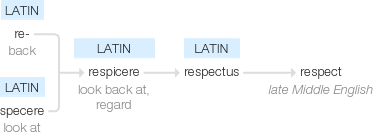Respect
late Middle English: from Latin respectus, from the verb respicere ‘look back at, regard’, from re- ‘back’ + specere ‘look at’.
wiktionary
From Middle English respect, from Old French respect, also respit(“respect, regard, consideration”), from Latin respectus(“a looking at, regard, respect”), perfect passive participle of respiciō(“look at, look back upon, respect”), from re-(“back”) + speciō(“to see”). Doublet of respite.
etymonline
respect (n.)
late 14c., "relationship, relation; regard, consideration" (as in in respect to), from Old French respect and directly from Latin respectus "regard, a looking at," literally "act of looking back (or often) at one," noun use of past participle of respicere "look back at, regard, consider," from re- "back" (see re-) + specere "look at" (from PIE root *spek- "to observe").
Meanings "feeling of esteem excited by actions or attributes of someone or something; courteous or considerate treatment due to personal worth or power." From late 15c. as "an aspect of a thing, a relative property or quality," hence "point, detail, particular feature" (1580s). With all due respect as a polite phrase introducing deferential disagreement is attested by 1670s.
respect (v.)
1540s, "to regard, notice with especial attention," from French respecter "look back; respect; delay" (16c.), from Latin respectere, frequentative of respicere "look back at, regard, consider," from re- "back" (see re-) + specere "look at" (from PIE root *spek- "to observe").
The meaning "treat with deferential esteem, regard with some degree of reverence" is from 1550s. The sense of "refrain from injuring or interfering with" is from 1620s. The meaning "have reference to, relate to" is from 1560s. Related: Respected; respecting.
To respect the person was "show undue bias toward (or against) based on regard for the outward circumstances of a person;" hence respecter of persons, usually with negative, from Acts x:34, in the 1611 translation.
